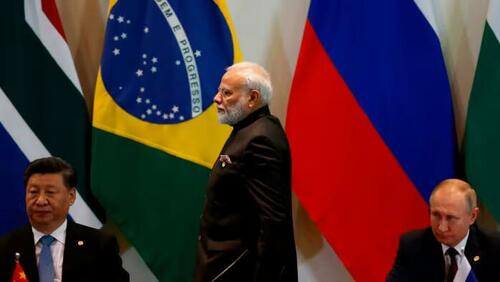Economics
Gone Fishing In Jackson Hole
Gone Fishing In Jackson Hole
By Bas van Geffen of Rabobank
The Fed’s annual economic symposium could not have been in a more appropriate…

Gone Fishing In Jackson Hole
By Bas van Geffen of Rabobank
The Fed’s annual economic symposium could not have been in a more appropriate place this year. Jackson Hole, Wyoming, is a great fly fishing spot. And there will probably be some fishing expeditions later this week.
First and foremost, market participants have been looking at the central banks for a bit more guidance after the latest data releases have traders concerned about the inflation outlook –and potential hikes being tacked on– once more. Yet, both Powell and Lagarde will probably tell markets to go fish, and refrain from giving clearer guidance into the September meeting as they await the final pieces of evidence regarding the economic and inflation outlook.
Meanwhile, central bankers themselves are busy trying to figure out just how much tightening the economy still needs, as economists are still clutching at straws where the neutral interest rate lies. Arguably, both Powell and Lagarde are currently quite happy with the odds that markets attach to another rate hike in the near future as long as it keeps traders from pricing in rate cuts that would effectively soften the monetary policy stance. There’s still the risks of both doing too much or too little in the fight against inflation, and the more traders price rate cuts, the bigger the risk that central bankers will have to raise rates further than they intend.
While the full agenda of the conference is kept secret until Wednesday, the title of this year’s symposium, “Structural Shifts in the Global Economy”, covers all of the risk factors. Domestically, the resilience of the labor market continues to puzzle many, and ageing could keep labor in relative short supply in many economies.
More disruptive shifts could follow from the further decoupling of the world’s major economies, and the developments on that front are once again not looking pretty. China will urge the BRICS countries to become a rival of the G7, as the bloc of emerging markets gathers in Johannesburg to discuss a potential expansion. This could chip away at the West’s global power through the IMF and the US dollar’s status as reserve currency. Brazil has reportedly been lobbying to require new members to join the New Development Bank, and the bloc may seek to reduce the use of dollars in trade flows between its members. Moreover, BRICS expansion could cover some countries that are vital to the West’s interests in decoupling from China, either because they are locations for re-shoring production, or because they possess key raw materials used in e.g. Europe’s green ambitions.
That said, getting so many countries with different economic and political systems aligned is always easier said than done. As an example, even the European project –with stringent accession criteria– has only achieved so much in its attempt to get a bigger global economic and political footprint since its inception. And the EU, to all intents and purposes, has been a relative success.
In addition to this soft power, China has also been showing its military teeth. Beijing launched joint air and see patrols around Taiwan. The military exercise came as the Western alliance held a summit at Camp David, and only a week after Taiwan’s Vice President Lai had angered China by traveling to Panama via the United States.
But Beijing may also be stepping up its global game to distract from the domestic issues. The struggling real estate sector and a high debt burden continue to depress the economic outlook. And in another sign that broad-based stimulus is probably not forthcoming, China’s banks left the 5-year loan prime rate unchanged, despite widespread expectations that this rate was going to be lowered by 15bp following the 15bp cut in the PBOC’s 1y medium term lending facility rate last week.
The absence of a cut in the banking sector’s key benchmark rate for mortgages may have been driven out of concerns over a narrowing interest margin for banks, especially as non-performing loans are rising. Yet, this impairment of monetary transmission will put an even bigger focus on non-monetary stimulus measures going forward.
Indeed, worried about potential spill-over effects into the broader financial system, local governments have reportedly increased their support for small to midsize banks. Between January and July, local governments have issued $20.3 billion in special bonds of which the proceeds were injected into some 125 different regional banks.
That makes the Chinese risks to the European and US economies harder to gauge. A decoupling could clearly be inflationary, especially if China manages to lure a bigger part of the world to their side of the divide. But as long as that does not materialize, the weakness of the Chinese economy could become a drag on the US and Europe too. While the risks of global financial contagion are probably a lot smaller than when the US real estate bubble burst, the impact on global demand and supply for goods would be far from negligible.
Tyler Durden
Mon, 08/21/2023 – 12:40
dollar
inflation
monetary
markets
reserve
policy
fed
bubble
us dollar
monetary policy
reserve currency
inflationary

Argentina Is One of the Most Regulated Countries in the World
In the coming days and weeks, we can expect further, far‐reaching reform proposals that will go through the Argentine congress.
Crypto, Crude, & Crap Stocks Rally As Yield Curve Steepens, Rate-Cut Hopes Soar
Crypto, Crude, & Crap Stocks Rally As Yield Curve Steepens, Rate-Cut Hopes Soar
A weird week of macro data – strong jobless claims but…
Fed Pivot: A Blend of Confidence and Folly
Fed Pivot: Charting a New Course in Economic Strategy Dec 22, 2023 Introduction In the dynamic world of economics, the Federal Reserve, the central bank…
















